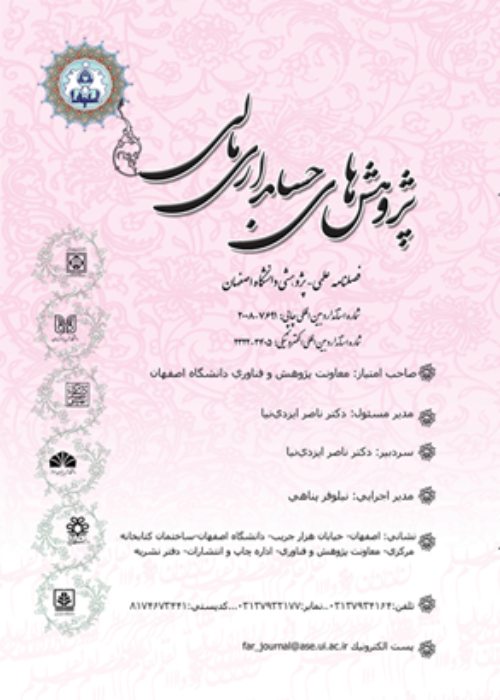A Framework for Identifying Material sustainability Criteria in the Exchange Industry Using Fuzzy AHP Method
Considering the important role of the exchange industry in the optimal allocation of resources and economic growth, as well as promoting a culture of attention to sustainability issues, the purpose of this study is to provide a comprehensive framework of material sustainability criteria in the exchange industry for integration into strategies, performance measurement, evaluation and reporting. In order to identify material sustainability criteria in the Iranian exchange industry, the findings of Ahmadi et al research (1401) which include 33 criteria and 352 sub-criteria have been used as a basis. In order to formulate a local framework, the participation of 21 industry experts was used to modify the criteria identified in the Ahmadi et al, according to the culture of Iran. Finally, after finalizing sustainability framework of the Iranian exchange industry, in order to evaluate materiality and prioritize the main criteria, the Fuzzy AHP method has been used. Considering the extensive effects of exchanges from the perspective of financing economic enterprises and the government (through transaction fee tax and issuing bonds), the findings of this study indicate the priority of economic dimension over other sustainability dimensions. Macroeconomics, government and other regulators and trust and confidence have the greatest relative importance among all other criteria. On the other hand, due to the low emissions of exchanges, the relative importance of environment dimension criteria is less than other dimensions in the industry. IntroductionThe number of countries that have organized capital markets has increased greatly in recent decades and investors' interest in capital markets have experienced unprecedented growth in recent years. As a result of the increased attention of society towards investing in capital markets, their awareness of sustainability issues has also increased. As a result, in such a situation, the necessity of proper management and sustainable performance of exchanges and issuing sustainability reports is more important than before. Sustainability reporting deals with how a company can report its sustainability performance in the form of a formal report, taking into account its responsibilities regarding positive and negative economic, social and environmental impacts (Hahn & Michael, 2013).In the current situation of Iranian exchanges and the volatility of stock prices and indices, the attention of a wide range of domestic stakeholders has been drawn to the performance of the exchanges. Therefore in the current situation, it is very important to achieve sustainable performance and be responsible to stakeholders. Therefore, the aim of this study is to answer the question that paying attention to what factors will guarantee the sustainable performance of exchanges and as a result economic development in the long term. Methods and material In order to identify the important sustainability criteria of the Iranian exchange industry in the present study, the results of Ahmadi et al were used as a basis. They presented a comprehensive international framework of sustainability. In order to confirm and modify their proposed model in domestic exchanges, the method of interviewing 21 experts has been used. Then, the fuzzy AHP method has been used to prioritize the sustainability criteria. The results of this process is providing a framework of the most important sustainability issues, considering the priority coefficients of each criterion.The paradigm of the current research is an interpretive paradigm, and in order to extract the sustainability criteria, an inductive approach has been used. From the perspective of research strategy, this study can be classified in the field of documentary and survey studies. Also, due to the use of quantitative and qualitative approaches to answer the research questions, this study used mixed method. On the other hand, due to the fact that this study was conducted at a specific point in time, this study is classified as a cross-sectional study. FindingsBased on the research findings, the most important sustainability criteria of the exchange industry can be classified in four economic, social, environmental, and corporate governance dimensions. After summarizing Ahmadi et al. (under publication) findings with the results of the interview coding process regarding the most important sustainability criteria of the Iranian exchange industry, 6 main criteria under the environmental dimension, 6 criteria under the social dimension, 11 criteria under the economic dimension and 13 criteria under the corporate governance dimension has been classified. Based on the findings of this study, the criteria of the economic dimension are the most important and the criteria of the environmental dimension are the least important in the Iranian exchange industry. Table 1: The relative and ultimate priority of sustainability framework criteria of Iran's exchange industryDimensionCriteriaRelative Importance of CriteriaUltimate Importance of CriteriaRelative Priority of CriteriaUltimate Priority of CriteriaEconomicMacroeconomics0.1400.07211EconomicGovernment and Other Regulators0.1290.06622EconomicTrust and Confidence0.1280.06533EconomicOperational Excellence0.1060.05444EconomicDiversified Products and Services0.0980.05055EconomicInnovation and Technology0.0930.04866EconomicListed Companies0.0830.04277Corporate GovernanceBoard of Directors0.1320.04018EconomicTransparency0.0740.03889Corporate GovernanceSelf-Regulation and Independence0.1250.037210EconomicDisclosure and Reporting0.0720.037911Corporate GovernanceMarket Regulation and Surveillance0.1190.036312EconomicFinancial and Economic Performance0.0670.0341013Corporate GovernanceRisk Management0.1060.032414Corporate GovernanceFinancial Crimes0.1050.031515SocialHuman Capital0.2250.027116Corporate GovernanceResponsibility and Accountability0.0840.025617SocialEducation and Training0.1850.022218SocialSupport for Startups and SMEs0.1830.022319SocialHuman Rights0.1780.022420Corporate GovernanceConflict of Interest Management0.0700.021721Corporate GovernanceStakeholder Management0.0660.020822SocialDiversity and Equality0.1630.020523Corporate GovernanceAudit and Assurance0.0610.018924Corporate GovernanceEthics0.0510.0151025EnvironmentalEnergy and Resource Management0.1960.014126EnvironmentalAwareness Raising and Participation in The Environment0.1930.013227EnvironmentalDesigning Environmental Instruments0.1790.012328EnvironmentalEnvironmental Requirements for Listing0.1780.012429Corporate GovernanceValues and Culture0.0390.0121130Corporate GovernanceVision0.0380.0111231EnvironmentalCarbon Footprint and Greenhouse Gas Emissions0.1500.010532SocialImproving the Living Standards0.0660.008633EnvironmentalCompliance with Environmental Rules0.1030.007634EconomicSupply Chain Management0.0110.0051135Corporate GovernanceWhistleblowing0.0040.0011336Total 1 Conclusion & ResultsAccording to the survey conducted by Wfe in 2016, the most important sustainability issues for exchanges include ethics and corruption, board of directors composition and remuneration, health and safety, risk management, labor standards, water use and recycling, pollution (air, water and waste), climate change and energy, supply chain, human rights and diversity. The findings of the survey conducted by Wfe are limited to 11 criteria, while in the present study a comprehensive approach has been used to identify the most important sustainability criteria and prioritize them. Findings include 36 main criteria and include all the provided criteria in the Wfe survey. The findings of this study will help exchanges to identify the most important issues that help to create shared value. The findings of this study can be used to develop sustainable strategies as well as the findings can also help providers of sustainability reports to choose the most important sustainability issues to report. In addition, due to the similarity of the mechanisms of the financial industry to the exchange industry, financial industry professionals can also use the findings of this research in their sustainability decisions.
- حق عضویت دریافتی صرف حمایت از نشریات عضو و نگهداری، تکمیل و توسعه مگیران میشود.
- پرداخت حق اشتراک و دانلود مقالات اجازه بازنشر آن در سایر رسانههای چاپی و دیجیتال را به کاربر نمیدهد.




